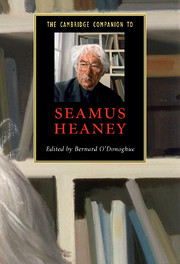Book contents
- Frontmatter
- 1 Introduction
- 2 Seamus Heaney’s Working Titles
- 3 The Context of Heaney’s Reception
- 4 Heaney in Public
- 5 Heaney and the Feminine
- 6 Heaney and Eastern Europe
- 7 Heaney’s Classics and the Bucolic
- 8 Professing Poetry
- 9 Heaney and the Irish Poetic Tradition
- 10 Irish Influence and Confluence in Heaney’s Poetry
- 11 Heaney and Yeats
- 12 Heaney’s Wordsworth and the Poetics of Displacement
- 13 Heaney, Beowulf and the Medieval Literature of the North
- 14 Crediting Marvels
- Guide to Further Reading
- Index
2 - Seamus Heaney’s Working Titles
From ‘Advancements of Learning’ to ‘Midnight Anvil’
Published online by Cambridge University Press: 28 March 2009
- Frontmatter
- 1 Introduction
- 2 Seamus Heaney’s Working Titles
- 3 The Context of Heaney’s Reception
- 4 Heaney in Public
- 5 Heaney and the Feminine
- 6 Heaney and Eastern Europe
- 7 Heaney’s Classics and the Bucolic
- 8 Professing Poetry
- 9 Heaney and the Irish Poetic Tradition
- 10 Irish Influence and Confluence in Heaney’s Poetry
- 11 Heaney and Yeats
- 12 Heaney’s Wordsworth and the Poetics of Displacement
- 13 Heaney, Beowulf and the Medieval Literature of the North
- 14 Crediting Marvels
- Guide to Further Reading
- Index
Summary
‘“Polder”, how do you pronounce “polder?”’ was the topic of discussion between Seamus Heaney and his editor at Faber and Faber, Charles Monteith, who advised the poet to ‘Never call a book by a title that people aren’t sure how to pronounce.’ ‘Polder’ never made it to the bookstores; neither did ‘Easter Water’, another working title for the same volume. But the collection of poems did finally appear under the title Field Work (1979). As well as receiving sound marketing advice, Seamus Heaney has been highly attuned to the mystical potential of book and poem titles (as well as the look of the book). For Heaney, ‘working titles’ are titles that ‘work’, as in successfully embodying the spirit of the poem or book in a way that resonates with the reader. But most obviously, ‘working titles’ are titles that serve as emblems capable of calling forth the essence of the book or poem from memory. In addition, ‘working titles’ are provisional titles, like ‘Polder’, that after serious consideration by the poet have been replaced because of internal and external pressures.
Heaney has said of the process:
What usually happens is that I start to look for one [a title] once a ‘critical mass’ of poems gets written. I find that if I have a working title at that stage – say when half a volume is in existence – the title itself can help in shaping, or at least inclining and suggesting, the poems to come.
If a title can help engender the ‘poems to come’, then it must also play a role in shaping the books to come. Writing great poems is one thing; giving them great titles is another; but assembling them with authority and vision into a dynamic whole takes more than mere talent. Ultimately, to compose one ‘great’ Yeatsian book out of all the books he has written is the final stroke of the Magus. What informs Heaney’s ‘great book’ is the notion of the poet as shaman and seer, as well as promoter and protester. Heaney has said that:
publication is rather like pushing the boat out; then the boat/book turns into a melting ice floe and you have to conjure a second boat that turns into a melting floe under your feet. All the stepping-stones that you conjure disappear under the water behind you.
- Type
- Chapter
- Information
- The Cambridge Companion to Seamus Heaney , pp. 19 - 36Publisher: Cambridge University PressPrint publication year: 2008
- 1
- Cited by

